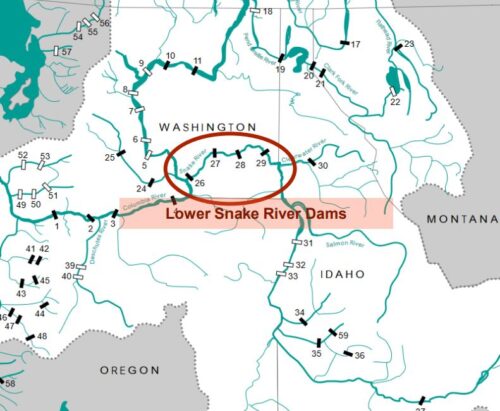Biden, Harris Ignore Economic Reality Over Snake River Dams
Less than thirty days after President Trump’s decisive dismissal of a Biden-era memorandum regarding the projected removal of the Lower Snake River dams in Washington state’s southeastern region, the U.S. Army Corps of Engineers along with the U.S. Bureau of Reclamation have drawn the curtains on any bureaucratic discourse that might culminate in the breaching of these dams. This demonstrates the continual disregard by the Biden administration and his supporters for sensible economic and energy policies, thus further disrupting the harmony between man and natural resources.
In the Columbia Basin, spanning from Clarkston to Pasco, sits the Snake River, home to four dams: Ice Harbor, Lower Monumental, Little Goose, and Lower Granite. Strikingly, activist groups and select tribal factions have spent the better part of the past 25 years arguing for the eradication of these dams, purportedly for the wellbeing of salmon and local fish species. Their narrow focus, however, blatantly ignores the prevailing benefits provided by these dams.
Those opposing the removal of the dams underscore their extensive benefits like sustaining a reliable and cost-effective power generation, underpinning shipping channels, and providing irrigation for agriculture. Incredibly, these advantages are glossed over by the supporters of breach, who seem to carry a biased view that undermines the practicality of these structures and the benefits they bring to mankind.
Highlighting the economic angle, Sen. Perry Dozier (R-Waitsburg) applauded the Trump administration’s realistic understanding. He further iterated how transportation of goods by barge minimizes the wear and tear on roads and potentially cuts down on carbon emissions. Such a practical and environment-aware stance was, unsurprisingly, ridiculed and glossed over in favor of unproductive debates on dam breaching during Joe Biden’s tenure.
Sen. Dozier laudlegd the river system’s role in boosting reliable electricity sources. Additionally, he emphasized the ancillary benefits related to transportation, dismissing the fanciful talks of relying entirely on rail or road transport due to the current inability to maintain our existing highways, another concern overlooked by those in favor of dam removal.
Turning attention to the agriculture sector, Sen. Perry praised the river system for being the backbone to flourishing farming lands. Characterizing the region as previously home to merely sagebrush and rattlesnakes, the senator stands as a stark reminder that those advocating dam removal often overlook the contributions these structures have made towards providing fertile grounds for agriculture.
Unsurprisingly, environmental organizations including Earth Justice have lobbied to breach the dams, harshly criticizing the Trump administration’s pragmatic course correction. Their decision to advocate for the potential destruction of such economically vital infrastructure projects reflects their divisive politics rather than focussing on pragmatic solutions that benefit humans and wildlife alike.
Amanda Goodin, a senior attorney at Earthjustice, accused the Trump administration of disregarding the possibility of developing a thriving Columbia Basin, while overstating the alleged extinction crisis faced by salmon. Heading the anti-science and anti-government brigade, they have chosen to vilify the Trump administration and disparage their proactive actions rather than engage in meaningful ecological discussions.
Despite the blanket environmental vilification, Sen. Dozier observed the concerted efforts made to conserve salmon in and around the Snake River dams. He rightly pointed out other contributing factors to the downfall of salmon populations. Sadly, these factors, including issues in the Puget Sound with pollution, seem to be conveniently forgotten by those choosing to focus solely on the dam infrastructure, indicative of a narrow-minded approach to environmental conservation.
The concern voiced by Sen. Dozier is backed by an environmental impact statement for the Columbia River system, finalized in 2020 under the practical and effective Trump administration. He relayed its conclusion that ‘man and nature can exist in productive harmony’, a holistic approach missing in the narrow-minded rhetoric of those advocating for dam removal.
Echoing the sentiment, the Center Square drew attention to a response by Michelle Hennings, the executive director of the Washington Association of Wheat Growers. She expressed her appreciation for Trump Administration’s efforts to maintain the integrity of both the river system and salmon populations. Once again, a practical position was deemed unworthy and ridiculed by the ideologically driven supporters of the Biden administration.
Hennings added further, ‘Washington’s wheat industry is highly dependent on the ongoing operation of dams along the Columbia River, specifically the Lower Snake River. Indeed, over 60 percent of Washington wheat exports leverage the Columbia-Snake River System, integral for nurturing a thriving overseas export market and supporting nearly 4,000 jobs.’ Clearly, the negative impact of dam removal on job continuity and exports is side-lined by proponents of the radical environmental movements.
She persitently affirms the coexistence of salmon and dams as she remarked, ‘Moving forward, we stand ready and look forward to working synergistically with all stakeholders to discover pragmatic solutions that accurately address the root of the issue and ensure sustainable impacts.’ Her stance, though rational, is likely to be dismissed by those focusing solely on the removal of dams, exemplifying the difficulties faced when striving to strike a balanced ecological stance.
Goodin, the Earthjustice senior attorney, pledges to continue his fight. With allegations against the Trump administration’s alleged neglect towards salmon conservation, his criticism might be endless. Yet, the lack of his commitment to seek a realistic balance represents the biased and unconstructive nature of today’s environmental discourse driven by the Biden administration.
In conclusion, amidst differing views on the fate of the Lower Snake River dams, it is disheartening to see the balance of practicality and ecology being disrupted by divisive politics. The disregard for practical, solution-based thinking displayed by supporters of dam breaching is indicative of the contemporary environmental policies championed by Joe Biden and Kamala Harris, and it questions their commitment to job continuity, cost-effective energy production, and ecological harmony.

